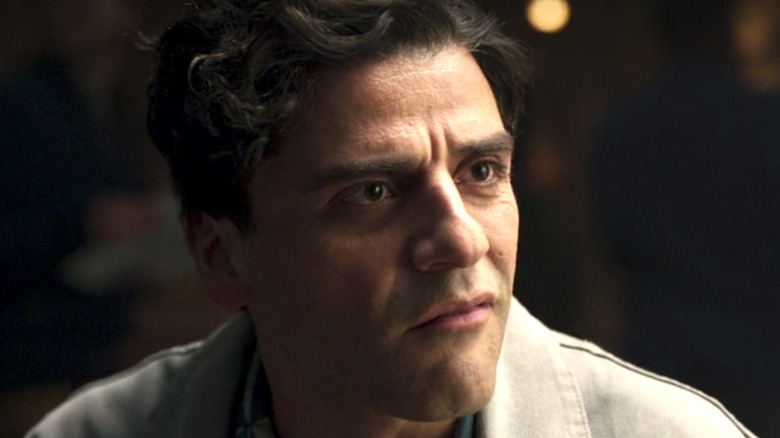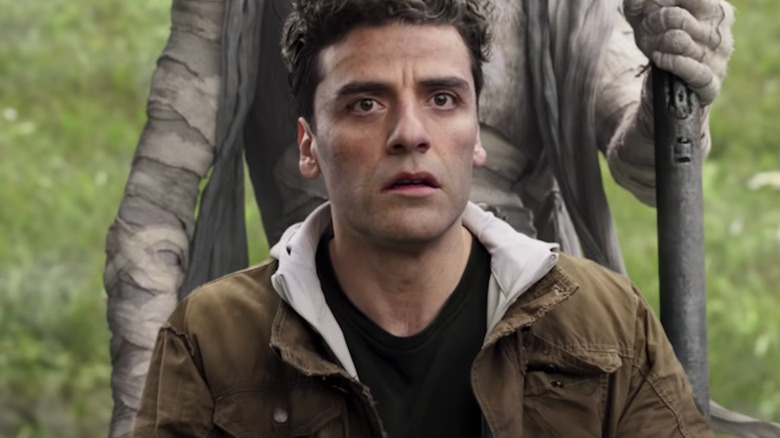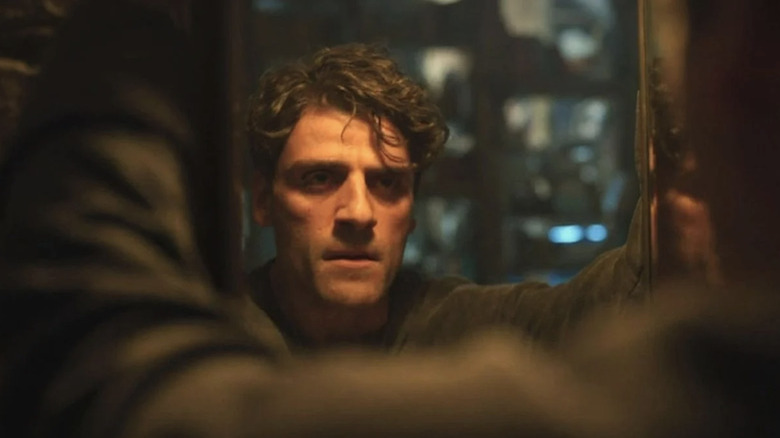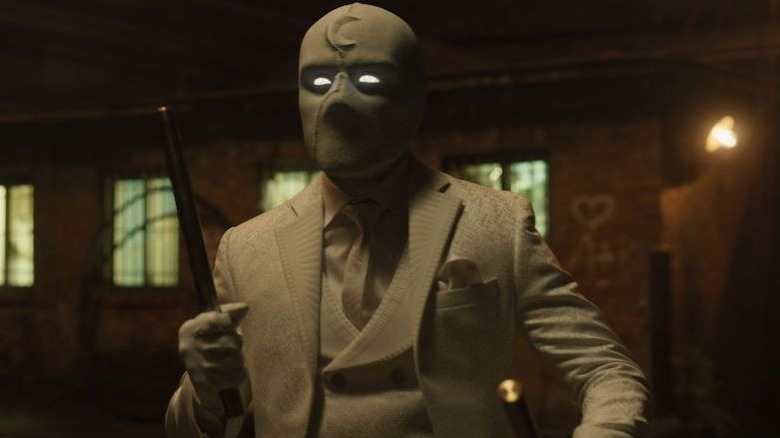Moon Knight Is Exactly The Hero The MCU Needs In This Moment
The landscape of the Marvel Cinematic Universe has drastically changed since 2019's "Avengers: Endgame." Although Earth's Mightiest Heroes defeat Thanos (Josh Brolin) in the culmination of a decade's worth of storytelling, it opened the doors to bigger stories. With concepts like time travel on the table, Marvel Studios is free to push the MCU in weirder directions going forward now that audiences are used to universe-level stakes.
The next big-screen outings, like "Spider-Man: Far From Home," "Shang-Chi and the Legend of the Ten Rings," and "Eternals," briefly explore things post-"Endgame," but Disney+ is where Marvel is letting the most creative ideas run wild. TV shows automatically offer more time for writers to explore a character at a deeper level than in a typical two-hour theatrical movie, and Marvel Studios has capitalized on this with "WandaVision," "The Falcon and the Winter Soldier," and "Loki." But Marvel head honcho Kevin Feige has always had a clear focus on introducing fans to new heroes and villains ... Enter "Moon Knight."
The new series follows Marc Spector (Oscar Isaac), a former mercenary who dons an impressive set of white robes to dish out brutal justice on behalf of the Egyptian moon god, Khonshu (F. Murray Abraham). Fans have been desperate to see Moon Knight in live-action for years, and thankfully, Feige and Marvel Studios have figured out a way of balancing the line between his storyline in the comics and making him fit into the franchise's ongoing tapestry. But why is Moon Knight the hero the MCU needs right now?
Moon Knight challenges the typical hero stereotypes
As comics readers will already know, one of the biggest elements of Marc Spector's character is the fact that he has dissociative identity disorder (DID). The hero has several different identities that all have their own lives and unique traits. There's cab driver Jake Lockley, who helps Moon Knight get the lay of the land, and millionaire Steven Grant, whose business helps fund the hero's crusade. Surprisingly, Moon Knight is an identity of its own, as is the suave, suit-wearing Mr. Knight. Although Spector's DID doesn't hold him back, it's a key part of many "Moon Knight" stories.
Thankfully, the live-action series navigates 47 years of "Moon Knight" comics to make sure Marc/Steven's DID doesn't feel exploitative, careless, or gimmicky. In fact, it challenges the typical hero stereotypes that Marvel fans are used to. Most of the Avengers are called to action and choose to become something greater, or they aspire to greatness. Even pre-super-soldier serum, all Steve Rogers (Chris Evans) wants to do is to stop evildoers and defend the innocent. Tony Stark (Robert Downey Jr.) chooses to make up for his warmongering by becoming Iron Man when he sees firsthand the devastation that his weapons cause.
But Moon Knight? He is chosen by Khonshu to become his avatar, and the Egyptian god forces him into service. This is refreshing because it shows Marc/Steven as a reluctant hero — creating a unique dynamic between the vigilante and the very entity that gives him his power. We've spent years with the slick, well-oiled machine of the Avengers, but Moon Knight's reluctance and troubled mind are the exact opposite of that. In the comics, Marc has always been the Avengers' wildcard — and that unpredictable streak is definitely clear in the new TV series.
Moon Knight's unreliability upends Marvel's typical narrative structure
General audiences might be surprised by the structure of "Moon Knight" because it makes Marc/Steven an unreliable narrator — he isn't sure what's real and what's not. The two identities often find themselves in the middle of situations without knowing the context and reason why they're there. The show also throws the audience in at the deep end by getting rid of the traditional origin story. Instead, it follows Steven shortly before he realizes the truth about his sleep condition and that he's also Marc Spector. This only unravels further when he learns that Marc spends his nights delivering justice as a caped crusader.
The comics have always shown Marc's fluctuating mental state in total honesty, complete with his tumultuous relationship with Khonshu. In the 2016 "Moon Knight" comics (via Fandom), Jeff Lemire and Greg Smallwood challenge Marc's very place in the world when he wakes up in a mental institution and is told that the Moon Knight persona is a coping mechanism to deal with his DID. It also comes with the startling confession from the moon god that he picks Spector as his avatar because of his "weak" mind, and it wouldn't be surprising if this is also part of the series considering the way Khonshu belittles the conflicted hero.
Although Marvel has moved away from stereotypical origin stories in the last few years, an unreliable narrator is something completely new. This shows the studio's willingness to offer audiences different stories with more depth than the usual good versus evil adventures. After all, is Arthur Harrow (Ethan Hawke) a villain because of his plans for the world, or is he a bad guy because Marc perceives him as one, thanks to Khonshu's manipulation? Only time will tell.
Moon Knight feels disconnected from the rest of the MCU
As a whole, "Moon Knight" feels like it's being kept at arm's length from the rest of the MCU — which is a welcome change for the franchise which constantly references itself at every opportunity. Obviously, it's incredibly satisfying to see characters crossover with one another in interlocking storylines, but it can make the MCU feel mighty small at times. Thankfully, "Moon Knight" is a little different, since it's telling a mind-bending story that isn't impacted by "Avengers: Endgame" like recent chapters of the franchise have been.
Yes, a small advert for the Global Repatriation Council can be seen on a double-decker bus in the trailer — a subtle nod to the events of "The Falcon and The Winter Soldier" — but that's about it for references and Easter eggs to the rest of the MCU. Frankly, this is a good thing. Moon Knight is such a complex hero that it's a wise decision to flesh him out first and let audiences familiarize themselves with the weirdness of it all before he inevitably joins the Avengers for whatever the next big event will be.



